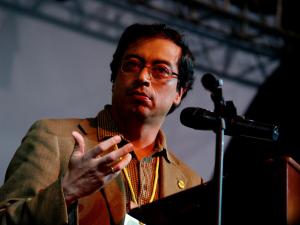From its coca-growing fiefdom in the country's southwest, Colombia's second-largest dissident FARC faction says peace talks with the government are stalled, and more.

Idaho Activists Plan Pared-Down Marijuana Legalization Initiative After Falling Short with Medical Marijuana Efforts. The activist group Kind Idaho, which just came up short on a signature drive to get a medical marijuana initiative on this year's ballot, repeating a similar failed effort in 2022, is now planning a slimmed-down noncommercial legalization initiative for the 2026 ballot.
The group was only able to come up with about 20,000 raw signatures when it needed about 70,000 valid voter signatures.
"We basically found that we didn't have the resources necessary to continue to push it in the way that we needed to, and we weren't getting the response and the support we needed from the community," Joe Evans, the campaign's treasurer, said.
So now, following a suggestion from the Marijuana Policy Project, Kind Idaho will draft an initiative that simply legalizes the consumption, possession, and cultivation of small amounts of marijuana for personal use.
"We don't have to go through the issue of creating a medical program," Evans explained. "We don't have to put a burden upon the medical field here in the state of Idaho by making them supervise quantities and qualities and dosages and all of that. We don't invite the industry -- whether medical or recreational marijuana -- into the state, because we're not actually legalizing resale. We're just saying you can grow your own and you can be in possession of it, as long as you're not planning on reselling it."
Kind Idaho plans to formally submit its new proposal to the secretary of state's office on September 17, triggering a roughly monthlong review period. Barring any major procedural hiccups, the campaign says it should be able to begin gathering signatures on November 1. Organizers will then have about 18 months to gather the roughly 70,000 valid voter signatures to put the measure on the 2026 ballot.
Medical Marijuana
Kentucky Medical Marijuana Program Sees Thousands of Applicants. The state has 74 licenses available for medical marijuana businesses, and while some industry stakeholders thought there was little interest among prospective businesses in obtaining a medical marijuana license in the state, that assumption has turned out to be incorrect.
The state's Office of Cannabis Management announced this week that the state has received 4,498 applications during the two-month application period that ended August 31. Nearly 90 percent of them came in during the last four days of August.
"This is significantly more than any initial projection," Gov. Andy Beshear (D) said Wednesday of the 4,998 applications. "The vast majority of these are for dispensaries, and the vast majority of those applications came in really in the last 24, if not 48, hours before the deadline."
There are 16 cultivation licenses up for grabs, 10 for small growers (up to 2,500 square feet), four for medium growers (up to 10,000 square feet), and two for large growers (up to 25,000 square feet). Nearly 600 potential businesses applied for those licenses.
There are 10 licenses for processors, for which 333 businesses applied, and five businesses applied for testing licenses, for which there is no cap. Some 4,000 businesses applied for the 48 dispensary licenses that will be allocated.
Medical marijuana will be legal in the state as of January 1, 2025, and the Office of Cannabis Management is now struggling to process all those late entries.
"However, 88% of the 4,998 applications were received in the last four days of the licensing period, meaning our attempts to review them as they come in, and thus to decrease the volume at the end that puts us up against deadlines, we wanted to be lower," Beshear said. "Turns out it's going to be higher than anticipated. Despite the last-minute influx of applications, the Office of Medical Cannabis is currently reviewing these applications. We remain on track to issue licenses in 2024. We are increasing our staff, almost doubling them, for reviewing the applications."
International
Colombia Peace Talks Blocked by Warrants for Rebel Leaders, Rebel Groups Say. Dissident leftist rebel factions who broke with the FARC after it signed a peace agreement with the government in 2016 have remained in a state of war with the government, operating from coca-producing areas of the country where they tax the trade as part of their fund-raising operations. Now, leaders of the second-largest FARC dissident group, the Frente Segunda Marquetalia, say peace talks are "blocked" because the government has failed to cancel arrest warrants for their leaders.
Segunda Marquetalia had entered into peace talks with the administration of leftist President Gustavo Petro in June, but a scheduled July meeting never happened, and the process has been stalled since then.
"The process is blocked, it's not moving forward," Walter Mendoza, chief negotiator for Segunda Marquetalia, told Agence France-Press in a rare interview.
"They deceived us," Mendoza, the rebels' second-in-command, said in a rare interview, adding that Segunda Marquetalia's members still had "the will to fight."
Segunda Marquetalia is the second-largest FARC dissident group still in the field behind its rival, the Central General Staff (EMC). Both groups and other dissident factions continue to control territory in the country's south and southwest. There they continue to fight Colombian security forces, rightwing paramilitaries, and apolitical criminal drug trafficking organizations in a conflict that has gone on for six decades despite the 2016 peace deal that was supposed to end it.
Mendoza said the group was still "fully committed" to the peace process, but the "main problem" was those arrest warrants. "Our repeated requests have gone unanswered," he complained. "We are not drug traffickers. We are a political and military organization," he added. "We don't tax the coca farmers."
This work by StoptheDrugWar.org is licensed under Creative Commons Attribution-ShareAlike 4.0 International
Add new comment